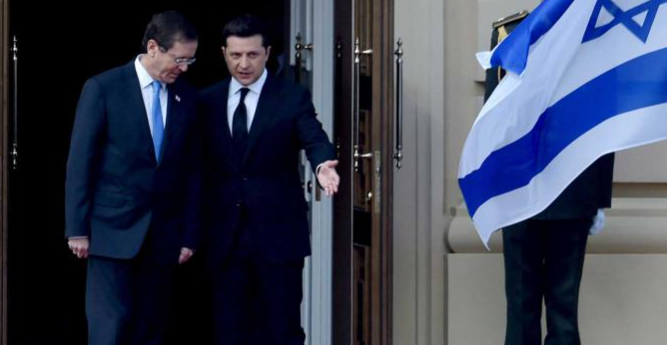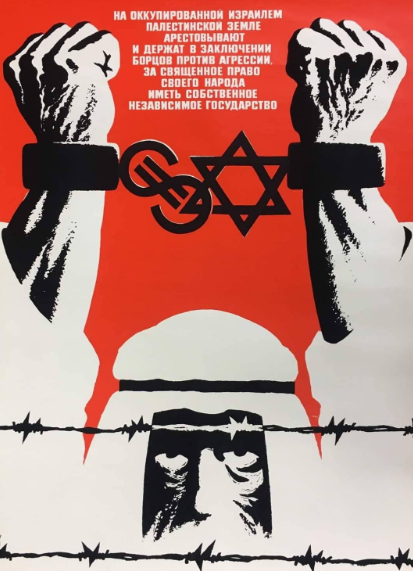Yves here. John Helmer’s latest piece, which includes a translated article from a major foreign policy pubilcation, explains how Russia should and probably will shift its stance towards Israel, and as a result, towards Palestine. It argues that Israel has only somewhat restrained its support of Kiev, and that is likely to change due to increased techno-military cooperation between Russian and Iran and ever rising pressure of the US on its allies. Although the post does not say so quite as bluntly, increased unity in the Arab-Persian world give Russia a chance to be more explicit in its support of that development by backing Palestine.
By John Helmer, the longest continuously serving foreign correspondent in Russia, and the only western journalist to direct his own bureau independent of single national or commercial ties. Helmer has also been a professor of political science, and an advisor to government heads in Greece, the United States, and Asia. He is the first and only member of a US presidential administration (Jimmy Carter) to establish himself in Russia. Originally published at Dances with Bears

The title of an op-ed piece by a Moscow academic, published this week in Vzglyad, bellwether of Russian security analysts, requires reading between the lines. Every Russian knows how to do this since the tsar’s chancellery posted bulletins outside the Winter Palace on how well the Russian Navy was doing in battles against the Japanese at Port Arthur in 1904.
Neither the gap nor the remedy has been the point of any communiqué issued from the regular meetings of the Kremlin Security Council, nor has it been discussed publicly in the state media, including the Valdai Club.
The Vzglyad headline refers to the one international conflict on which President Vladimir Putin has said so little since the start of his term, and done so much – this is Israel’s war against Palestine.
The gap was made visible once by the General Staff; that was in September 2018 after the Israel Air Force caused the shoot-down in Syria of a Russian Ilyushin-20M electronic reconnaissance aircraft (lead image), and the killing of all fifteen crewmen on board. At that time the Russian military expressed a loss of confidence which had not been seen in public since President Boris Yeltsin countermanded orders for Russian military aid to Serbia under NATO bombing between March and June 1999, dismissing Prime Minister Yevgeny Primakov on the US demand.
Read the first report of the evidence in the Il-20 case on September 18, 2018, and the second report on September 24, 2018. The third report two months later revealed what happened after Putin had what the Kremlin spokesman called “a short talk” with Israeli Prime Minister Benjamin Netanyahu in Paris on November 11, 2018. The next day, the Security Council notice of November 12 reported Putin had “informed the permanent members of the Security Council about several of his brief meetings on the sidelines of the events in Paris.”
Four and a half years have elapsed since then. The Vzglyad headline of April 17 means there is a policy, and there is pressing reason of state to change it now. Inside the text, the point is expressed by its author more tentatively. “Perhaps it’s time to change the approach somewhat? After all, it no longer fully corresponds to both the changed regional situation and Russian national interests.”
Read the original here. The translation into English has not been acknowledged or approved by Vzglyad or its author, Gevorg Mirzayan. The only editing to the original text are modifications of punctuation. Illustrations and their captions have been added for reference.

Source: https://vz.ru/
 April 17, 2023It’s time for Russia to change its position in the Israeli-Palestinian conflict
April 17, 2023It’s time for Russia to change its position in the Israeli-Palestinian conflict
By Gevorg Mirzayan
Associate Professor of the Department of Political Science of the Financial University under the Government of the Russian Federation
The Israeli-Palestinian conflict is once again experiencing a stage of aggravation. Clashes between Israeli and Palestinian policemen on the Temple Mount — where the Wailing Wall, sacred to Jews, and the Al-Aqsa Mosque, sacred to Muslims, are located — turned into real fighting, including bombing of the Gaza Strip and rocket attacks from the Strip on Israeli cities.
And this is not the end of the holy month of Ramadan, on the last Friday of which the Islamic world celebrates Al-Quds Day, that is, Jerusalem Day. Introduced by the late Supreme Ayatollah of Iran Ruhollah Khomeini in 1982, this day is actively used in the Muslim world to condemn the methods and consequences of the Israeli occupation of Jerusalem – that is, to express solidarity with the people of Palestine. In practice, this solidarity is expressed in loud statements by leaders, anti–Israeli rallies and other demonstrations – the exploitation by the Israelis, who have regularly violated the rights of the Palestinians, has always given enough reasons for loud words.
Until recently, Russia, a country with a large Muslim community, refrained from celebrating Al-Quds Day. At best, the leaders of Russian Muslims have spoken about the suffering of the Palestinian people, and academic conferences on the Middle East were held. And this was quite understandable: Moscow adhered to an equidistant policy on the Palestinian issue, trying to maintain relations with both Israel and the Arab world at the same time.

May 16, 2021: https://johnhelmer.net/
But perhaps it’s time to change the approach somewhat? After all, it no longer fully corresponds to both the changed regional situation and Russian national interests.
By changing the regional situation, we mean, first of all, the processes associated with the Iranian-Saudi normalization. Representatives of Tehran and Riyadh did not just shake hands after the talks in Beijing. They began a real process of resolving bilateral contradictions (in Syria, Yemen, etc.). And this means not only the collapse of Tel Aviv’s (and Washington’s) strategy of using Saudi Arabia for a war with Iran, but also the consolidation of the two leaders of the Islamic world on an issue that concerns the entire Islamic world. That is, simply put, the Palestinian issue.
At the same time, this issue is, in fact, an element of an even larger trend – the struggle of developing countries against the neo-colonialism of the West. A trend in which Russia is not just trying to embed its own security in Ukraine, but also to embed from the position of the new leader of the entire anti-colonial movement. And the leader must be ahead, including in terms of rhetoric.
Moscow needs this leadership from the point of view of its national interests. And, it would seem, they contradict another interest – the policy of neutrality, of equidistance. However, this policy was necessary — necessary and beneficial precisely until Israel took a very peculiar position with regard to the Russian Special Military Operation (SMO). This is the position of the blackmailer.
As part of this position, Tel Aviv is supplying the Kiev regime with various kinds of ordnance and even weapons, but so far is refraining from supplies of high–tech systems. Tel Aviv explicitly says that its decision on these supplies will depend on the level of Russian-Iranian cooperation. Well, well. Or else this depends on the mood of a particular Israeli leader – after all, there is no consensus position on this issue in Israel. If the current Prime Minister Benjamin Netanyahu opposes supplies, then his predecessor Yair Lapid (the same one who at the beginning of the conflict accused the Russian army of war crimes in Ukraine) was inclined in favour of supplies. In spite of the fact that the ideological descendants of those who committed the Holocaust are in power in Kiev.

Israel’s President Chaim Herzog (left) meeting Ukrainian President Vladimir Zelensky (right) in Kiev on October 5, 2021. “How can you not help the victims of such aggression," Zelenksy told Herzog: “I don't how to answer the questions that I always get about how has Israel helped and what else can Israel do.I am grateful to the people of Israel. I am grateful for the sincere and emotional support to the people of Ukraine...but we would like to also get support from your government.” Naftali Bennett was Israeli prime minister at the time. Yair Lapid was alternate prime minister and foreign minister then; he became prime minister between July and December 2022, and was succeeded by Benjamin Netanyahu on December 29, 2022.
From a pragmatic point of view, Israel’s position can, of course, be understood – and even excused in some respects. First, Israel’s security largely depends on the United States. Yes, Tel Aviv (unlike, for example, Tokyo) has nuclear weapons. But recent conflicts show that the presence of the ‘last argument of kings’ is not enough to wage large conventional wars. Israel needs an American army, weapons, intelligence resources – and as a payment for access to all this, the Israeli leadership is required to support the foreign policy of the White House. Including in the Ukrainian direction.
Secondly, Israel categorically does not like the current Russian-Iranian rapprochement. Yes, Tel Aviv understands that it is primarily due to Iran’s willingness to provide direct military-technical assistance to Russia within its framework — and Moscow cannot throw away friendship with such countries. Yes, in Tel Aviv they understand that even the SMO did not force Russia to abandon one of its key foreign policy postulates: ‘Moscow is friends with those who are ready to be friends with it, but this friendship is not directed against those who are not hostile to Russia.’ Based on this concept, Russian-Iranian cooperation is not directed against countries which are friendly or at least neutral towards Russia.
Tel Aviv understands all this, but believes that circumstances have changed. That Russian-Iranian military-technical cooperation (forced or not, it doesn’t matter) reaches such a high level that it can no longer but threaten the security of Israel. In particular, according to experts, Iran, with the help of Russian specialists, has created a very powerful layered air defense system, which has reduced the already small chances of Israel bombing Iranian nuclear facilities.
However, Russia, also understanding Israel’s position, can draw the following conclusions from this. Firstly, Israel supports the Kiev regime. Secondly, the level of this support will grow (partly due to US pressure, and partly due to the objective development of the Russian-Iranian partnership). Thirdly, it is pointless to make any concessions to the blackmailer.

Soviet poster of 1978. The text says: “In the Israel occupied territory, Palestinians fighters against aggression and for the sacred right of their people to have their own independent state are arrested and kept in jail."
In regular polling by the Levada Centre of Moscow since 2006, between 2% and 5% of a nationwide sample of Russians has identified Israel as one of the top-5 allies of Russia; and the same proportion has identified Israel as one of Russia’s top-5 enemies. The pollster reports regular surveys showing Russian attitudes towards Palestine growing more positive towards the Palestinians, more hostile to the Israelis. Follow this here. For more on the evolution of Al Quds Day, read this.
That is why, perhaps, the time has come to take a new position on the Palestinian issue. To take the celebration of Al-Quds Day to a new level, as well as to take a more pro-Palestinian position in the Middle East conflict. To stand on the side of those who help Russia within the framework of their own interests (Iran, Saudi Arabia) against those who help our enemies. And thereby to send a very clear signal to the world – a signal that Russia will treat its partners exactly as they treat it. To help supporters – and not to act in the interests of opponents.



I hope Putin will be able to consider (by some means or another) those polling results Helmer included under that last image of the 1978 Soviet poster. The article Helmer has translated puts forward many good arguments but this last point that Helmer added is just as important. I hear various people speculating that perhaps Putin has arrived late several times to attitudes already held by the majority of the Russian population and this to me seems like an excellent opportunity for him to do this again.
I wouldn’t be so sure that the majority of the Russian population is pro-Palestine. For one thing, a lot of us have relatives among the Israeli Jewish population. I doubt there are many Russians with Palestinian relatives. Family ties count for a lot as far as personal perceptions are concerned.
Where do you live? I know a bunch of Jews immigrated when the Soviet Union was crumbling into pieces either to the US or to Israel. I would be surprised there are “many” left behind. As for the Muslims, a lot of the satellite countries are populated by them.
The historic tectonic plates are shifting again, it looks like we are back to a world ruled by 2 superpowers, the ‘new’ one being the Sino-Russian alliance, a well-balanced partnership of military capability, the majority of the world’s manufacturing capacity & most of the remaining crucial resources. (per capita)
China subtly demonstrated this new power diplomatically with the Iranian-Saudi de-escalation process and defanging the US naval blockade with overland trade routes uniting Eurasia to exclude any need for future interaction with the US. Russia similarly stepped up by showing it can resist any sanctions the West can think of, while simultaneously beating any military action or equipment Nato has to offer and excluding its enemies from its export list of important resources such as energy, minerals and fertilisers.
US vassals and all other lackeys are starting to find out they are no longer on the winning side, so the stronger ones, like the Saudis & Turkey are finding the courage to push back against pressure to follow.
I never could understand the shoot-down of that Russian Ilyushin-20M recon plane. The Israelis hit Syria continuously but this time they made sure that they set that plane up so that it would be shot down by local Syrian defenses. They did not have to do it but went out of their way to kill that crew and I think I read that those Israeli pilots were celebrating after landing. If it was some sort of “message” to the Russians I would say that it was successful. Unfortunately for the Israelis, it may have not been the message that they thought that they were sending. I have no idea why the Israelis thought that the Russians would be cool with doing that as they would have been screaming to the UN if the Russians had shot down an Israeli plane and killing their crew. Netanyahu tried to put all the blame on Syrian defenses but the Russians knew what happened.
Now that the Israelis have received and celebrated an Azov delegation and are selling some military gear to the Ukraine, the Russians are drawing their own conclusions. And since the Saudis and Iranians have reconciled – read Sunni and Shia – this leaves Israel out in the open with only the Biden White House to protect them. Scary thought that. If the Russians are changing their position and China has announced an interest in the Palestinians, this may be a chance for the Israelis to reconcile with the Palestinians and achieve a more secure position in the Middle east. Unfortunately for the Israelis, their present government would fight that happening to the bitter end and are playing the zero-sum game.
And yet, what did Putin do in response to Israel’s killing of Russian soldiers? Basically nothing. Endlessly flexible “red lines”. But things have changed now. Israel is on the wrong side of history along with the West. Time for Russia to announce consideration of supplying appropriate advanced weapons to North Korea (in retaliation of South Korea supplying arms to Ukraine) AND also to Syria Iran and an appropriate representative of the Palestinians. Let Israel & S Korea figure out what’s REALLY in their self interest. Or not, and pay a price.
Beware the vengeance of a patient man.
—And yet, what did Putin do in response to Israel’s killing of Russian soldiers? Basically nothing. Endlessly flexible “red lines”.—
The West consistently and crudely interprets restraint (and rationality) of its adversaries as weakness.
This is how the West got stuck in the present Ukraine quagmire and its deluded circle jerk of Russian weakness.
And at the present rate, this mentality is setting the US on a collision over Taiwan and going to get thousands of American sailors killed.
“Clever people, there Chinese!”
Israel is a vassal, therefore can’t extricate itself except by making itself not a vassal. It strikes me that Netanyahu has been making the kind of political moves that would sour the US public on Israel, may ultimately result in Israel extricating itself from its US ownership.
So there’s an opportunity to make peace with the neighbours, settle this matter. Which Israel would not be able to do as a US partner.
The thing is, Netanyahu will be most politically, ideologically and philosophically aligned with any country closely approximating his own aims for a supremacist apartheid state. This happens to be the same path Zelenskyy wants for Ukraine. Indeed, Zelenskyy is probably having the same conversations, with the same hand gestures, as Ben Gurion earlier with regard to pushing out, ethnic cleansing, the natives – in Zelenskyy’s case, Ukrainian-Russians. It’s almost the same project, two identifiable groups living in the same place, one wanting to push out the other, take the place for themselves. And didn’t Zelenskyy in his speech to Israeli parliamentarians say so?
Israel has also blackmailed itself, in a sense. Severely restricted its own options, and now comes to a point where it doesn’t have any.